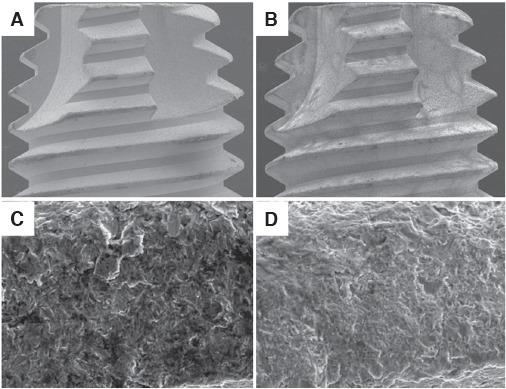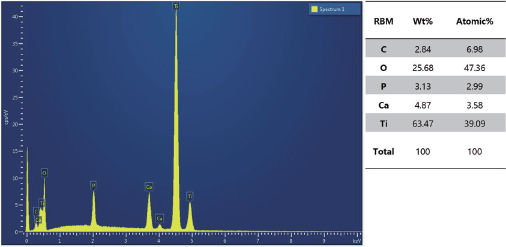J Korean Acad Prosthodont.
2018 Jan;56(1):1-7. 10.4047/jkap.2018.56.1.1.
Comparison of removal torque of saline-soaking RBM implants and RBM implants in rabbit tibias
- Affiliations
-
- 1Department of Prosthodontics, School of Dentistry, Kyungpook National University, Daegu, Republic of Korea. sungamcho@gamil.com
- KMID: 2402981
- DOI: http://doi.org/10.4047/jkap.2018.56.1.1
Abstract
- PURPOSE
The purpose of this study is to investigate the effect of the titanium implant soaked in saline after RBM surface treatment on the initial osseointegration by comparing the removal torque and the surface analysis compared to the titanium implant with only RBM surface treatment.
MATERIALS AND METHODS
The control group was RBM surface treated implants (RBM), and the test group was implants soaked in saline for 2 weeks after RBM surface treatment (RBM+Sal). The control and test group implants were placed in the left and right tibiae of 10 rabbits, respectively, and at the same time, the insertion torque (ITQ) was measured. After 10 days, the removal torque (RTQ) was measured by exposing the implant site. FE-SEM, EDS, Surface roughness and Raman spectroscopy were performed for the surface analysis of the new implant specimens used in the experiments.
RESULTS
There was no significant difference in insertion torque and removal torque between RBM surface treated titanium implants and saline-soaked titanium implants after RBM surface treatment.
CONCLUSION
Saline soaking after RBM surface treatment of titanium implants did not positively affect the initial osseointegration as compared to titanium implants with only RBM surface treatment.
Keyword
MeSH Terms
Figure
Cited by 1 articles
-
The effects of saline soaking on the removal torque of titanium implants in rabbit tibia after 10 days
Jung-Hyun Park, Sung-Am Cho
J Korean Acad Prosthodont. 2019;57(4):328-334. doi: 10.4047/jkap.2019.57.4.328.
Reference
-
1. Anil S, Anand PS, Alghamdi H, Jansen JA. Turkyilmaz Ilser, editor. Dental implant surface enhancement and osseointeration, implant dentistry - A rapidly evolving practice. Intech;2011. 83–108. Available from: http://www.intechopen.com/books/implant-dentistry-a-rapidly-evolving-practice/dental-implant-surface-enhancement-and-osseointegration.2. Parithimarkalaignan S, Padmanabhan TV. Osseointegration: An Update. J Indian Prosthodont Soc. 2013; 13:2–6.
Article3. Shalabi MM, Gortemaker A, Van't Hof MA, Jansen JA, Creugers NH. Implant surface roughness and bone healing: a systematic review. J Dent Res. 2006; 85:496–500.
Article4. Cooper LF. A role for surface topography in creating and maintaining bone at titanium endosseous implants. J Prosthet Dent. 2000; 84:522–534.
Article5. Dario M, Nicola M. Surface treatments for titanium implants. Int J Clin Dent. 2015; 8:139–149.6. de Jonge LT, Leeuwenburgh SC, Wolke JG, Jansen JA. Organic-inorganic surface modifications for titanium implant surfaces. Pharm Res. 2008; 25:2357–2369.
Article7. Coelho PG, Marin C, Granato R, Giro G, Suzuki M, Bonfante EA. Biomechanical and histologic evaluation of non-washed resorbable blasting media and alumina-blasted/acid-etched surfaces. Clin Oral Implants Res. 2012; 23:132–135.
Article8. Buser D, Broggini N, Wieland M, Schenk RK, Denzer AJ, Cochran DL, Hoffmann B, Lussi A, Steinemann SG. Enhanced bone apposition to a chemically modified SLA titanium surface. J Dent Res. 2004; 83:529–533.
Article9. Zhao G, Schwartz Z, Wieland M, Rupp F, Geis-Gerstorfer J, Cochran DL, Boyan BD. High surface energy enhances cell response to titanium substrate microstructure. J Biomed Mater Res A. 2005; 74:49–58.
Article10. Carlsson L, Rötlund T, Albrektsson B, Albrektsson T. Removal torques for polished and rough titanium implants. Int J Oral Maxillofac Implants. 1988; 3:21–24.11. Schwarz F, Wieland M, Schwartz Z, Zhao G, Rupp F, Geis-Gerstorfer J, Schedle A, Broggini N, Bornstein MM, Buser D, Ferguson SJ, Becker J, Boyan BD, Cochran DL. Potential of chemically modified hydrophilic surface characteristics to support tissue integration of titanium dental implants. J Biomed Mater Res B Appl Biomater. 2009; 88:544–557.
Article12. Rupp F, Scheideler L, Eichler M, Geis-Gerstorfer J. Wetting behavior of dental implants. Int J Oral Maxillofac Implants. 2011; 26:1256–1266.13. Lee HJ, Yeo IS, Kwon TK. Removal torque analysis of chemically modified hydrophilic and anodically oxidized titanium implants with constant angular velocity for early bone response in rabbit tibia. Tissue Eng Regen Med. 2013; 10:252–259.
Article14. Fuming H, Guoli Y, Xiaoxiang W, Shifang Z. The removal torque of titanium implant inserted in rabbit femur coated with biomimetic deposited Ca-P coating. J Oral Rehabil. 2008; 35:754–765.
Article15. Albrektsson T, Brånemark PI, Eriksson A, Lindström J. The preformed autologous bone graft. An experimental study in the rabbit. Scand J Plast Reconstr Surg. 1978; 12:215–223.
Article16. Sanz-Sánchez I, Sanz-Martín I, Figuero E, Sanz M. Clinical efficacy of immediate implant loading protocols compared to conventional loading depending on the type of the restoration: a systematic review. Clin Oral Implants Res. 2015; 26:964–982.
Article17. Esposito M, Grusovin MG, Maghaireh H, Worthington HV. Interventions for replacing missing teeth: different times for loading dental implants. Cochrane Database Syst Rev. 2013; (3):CD003878.
Article18. Webb K, Hlady V, Tresco PA. Relative importance of surface wettability and charged functional groups on NIH 3T3 fibroblast attachment, spreading, and cytoskeletal organization. J Biomed Mater Res. 1998; 41:422–430.
Article19. Le Guéhennec L, Soueidan A, Layrolle P, Amouriq Y. Surface treatments of titanium dental implants for rapid osseointegration. Dent Mater. 2007; 23:844–854.
Article20. Albrektsson T, Wennerberg A. The impact of oral implants -past and future, 1966-2042. J Can Dent Assoc. 2005; 71:327.21. Hansson S, Norton M. The relation between surface roughness and interfacial shear strength for bone-anchored implants. A mathematical model. J Biomech. 1999; 32:829–836.
Article22. Brett PM, Harle J, Salih V, Mihoc R, Olsen I, Jones FH, Tonetti M. Roughness response genes in osteoblasts. Bone. 2004; 35:124–133.
Article23. Sul YT, Johansson CB, Albrektsson T. Oxidized titanium screws coated with calcium ions and their performance in rabbit bone. Int J Oral Maxillofac Implants. 2002; 17:625–634.
- Full Text Links
- Actions
-
Cited
- CITED
-
- Close
- Share
- Similar articles
-
- On the effect of saline immersion to the removal torque for resorbable blasting media and acid treated implants
- Comparison of the removal torque and a histomorphometric evaluation of the RBM treated implants with the RBM followed by laser treated implants: an experimental study in rabbits
- Removal torque of bicortically stabilized RBM(resorbable blast media) pin implants in rabbit tibia
- Histologic evaluation and removal torque analysis of nano- and microtreated titanium implants in the dogs
- Influence of surface treatment on the insertion pattern of self-drilling orthodontic mini-implants






